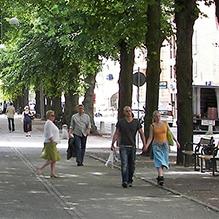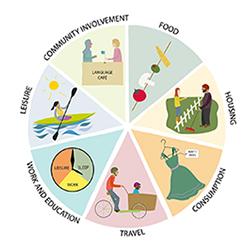Sustainable Lifestyles - Tools and Methods
A growing and richer world population generates greenhouse gas emissions that are not sustainable at medium-long term. To decrease the human impact over the climate and achieve a fairer division of emissions between people in different parts of the world, changes in lifestyles are necessary. The project aims to visualize what sustainable lifestyles mean and what can be done at local or regional levels, in the Region Västra Götaland, Sweden, to support sustainable lifestyles.
The project is initially a collaboration between the City of Gothenburg, Chalmers University of Technology and SP Technical Research Institute under the Mistra Urban Futures, but more partners will be tied to the project during 2015. This year a concrete action plan will be developed for 2016-2018.
Erica Eneqvist, project manager, presents Sustainable Lifestyles at a workshop in Hammarkullen 4 February 2016.
The project has three sub-areas including:
- to definine sustainable lifestyles,
- to identify and highlight in which way local and regional authorities can support sustainable lifestyles among its citizens
- to share experiences with other regions around the world through the UN Sustainable Lifestyles and Education Programme
The City of Gothenburg is a world pioneer in measuring the environmental impact from consumption. The City has also launched policy documents with strategies and measures on how the city should facilitate sustainable lifestyles. When these now are to be put into practice, it is important to first define what we mean by sustainable lifestyles. How to measure the environmental impacts, emissions and social benefits at the individual level? What is the connection between sustainable lifestyles and sustainable development at the community level?
Local and regional public entities, such as municipalities, county councils and regions, together have a big resourcefulness when it comes to lifestyle issues. The problem is that the local policy instruments and tools are not always clear and that they are not used. One challenge is to visualize in an easy way to the actors how their actions enable or hinder sustainable lifestyles. Another challenge is to have the courage to say that a certain lifestyle is more sustainable than another.
10YFP Programme on Sustainable Lifestyles and Education
The 10YFP Programme on Sustainable Lifestyles and Education (http://www.unep.org/10yfp/) was launched at the UNESCO World Conference in November 2014. The programme is co-led by the Ministry of Environment of Japan, the Government of Sweden represented by the Stockholm Environment Institute (SEI) and the World Wide Fund for Nature (WWF). By participating in this UN Programme, the project will exchange knowledge and experiences on how to stimulate sustainable lifestyles locally and regionally with other actors in Sweden and the rest of the world.







